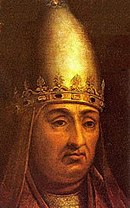Papal conclave, 1294

Coat of arms during the vacancy of the Holy See
|
|
| Dates and location | |
|---|---|
| 23–24 December 1294 Castel Nuovo, Naples |
|
| Key officials | |
| Dean | Gerardo Bianchi |
| Camerlengo | Tommaso d'Ocra |
| Protopriest | Benedetto Caetani |
| Protodeacon | Matteo Rosso Orsini |
| Election | |
| Ballots | 1 |
| Elected Pope | |
|
Benedetto Caetani (Name taken: Boniface VIII) |
|
 |
|
The papal conclave of December 23–24, 1294 was convoked in Naples after the resignation of Pope Celestine V on 13 December 1294. Celestine V had only months earlier restored the Constitution Ubi periculum of Pope Gregory X, which had been suspended by Pope Adrian V in July 1276. From that time every papal election has been a papal conclave. It is the first papal conclave held during the lifetime of the preceding pontiff, the second such occurrence taking place in 2013 following the resignation of Pope Benedict XVI.
Celestine V, founder of the Order of Celestines, widely esteemed and venerated for his holiness, was elected to the papacy on July 7, 1294, as a compromise choice after an over two-years long sede vacante. It quickly became clear that this saintly eremite was wholly incompetent and unsuited for a job as pope. Admitting his own incompetence soon after his election, Celestine expressed the wish to abdicate and return to his solitary cave in the Abruzzi Mountains. However, before doing so he issued two bulls. The first bull established the regulations concerning the abdication of a pope. The second bull (Quia in futurum, September 28, 1294) restored the constitution Ubi periculum, which established the papal conclave; the constitution had been suspended by Pope Adrian V in July 1276. During his short papacy, he also created 13 new cardinals. Eventually, on December 13, 1294, Celestine V abdicated the papacy at Naples, three days after confirming the restoration of the institution of the papal conclave.
It has been widely stated that the alleged great influence of the ambitious Cardinal Benedetto Caetani and the pressure he applied on Celestine V were important factors in Celestine's decision to abdicate, but it seems nearly as certain that it was an entirely voluntarily step of the Pope, with the role of Caetani limited to participation in the solution of the legal problems connected with the resignation of a pope. In particular, there were doubts whether a pope could resign at all, and who would be authorized to accept such a resignation.
...
Wikipedia
